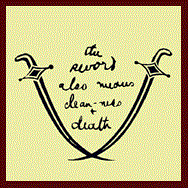Introduction
Acknowledgements
Notes and abbreviations

Home
The last prophet
p [339], wood-cut, Hughes-Stanton, 131 x 127 mm
Abstract shapes with indistinct figure dragging child with left hand, centre front.
p 215 [tr ed p 234] - 'Such people demanded a war-cry and banner from outside to combine them, and a stranger to lead them, one whose supremacy should be based on an idea: illogical, undeniable, discriminant: which instinct might accept and reason find no rational basis to reject or approve. For this army of Feisal's the conceit was that an Emir of Mecca, a descendant of the prophet, a Sherif, was an other-worldly dignitary whom sons of Adam might reverence without shame. This was the binding assumption of the Arab movement; it was this which gave it an effective, if imbecile unanimity.'
Next illustration - Appeasing a tumult
Click here to return to
the full listing of the illustrations -
Click here to return to
the introductory paragraphs on the illustrations -